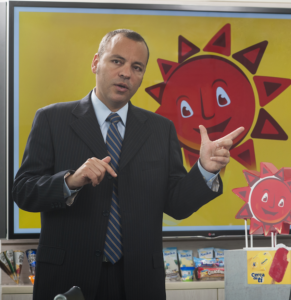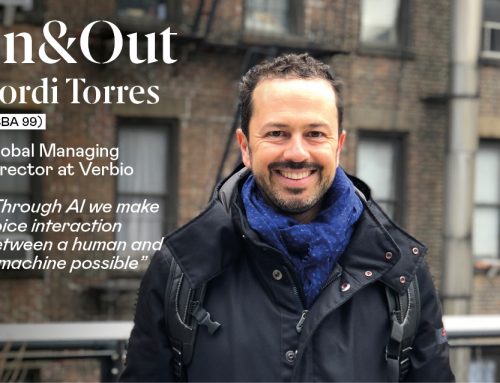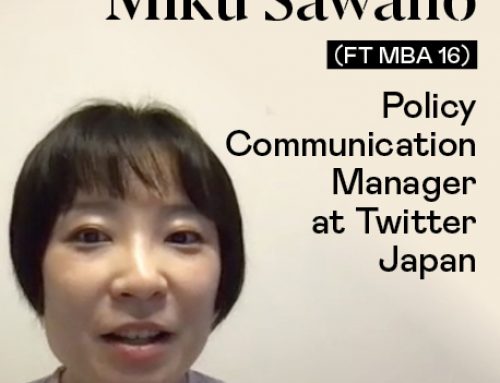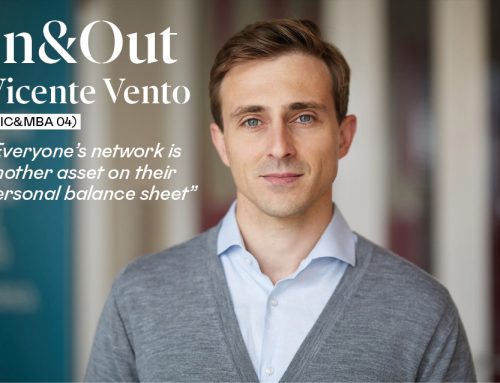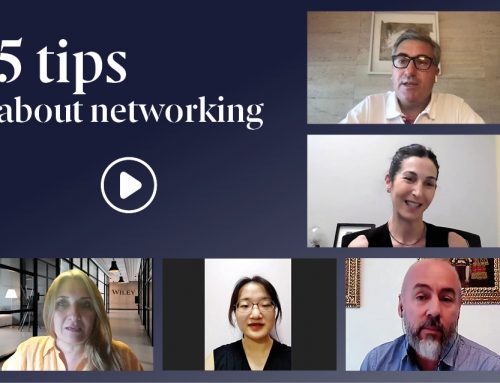Domenico Casaretto (MBA 18), Business Executive Manager of Ice Cream Division at Nestlé Peru
In charge of leading strategic planning within the Ice Cream Division at Nestlé Peru, Domenico Casaretto leads and works with all the areas within the context of the company’s value chain to ensure profit/loss, sales and profitability as well as consumer preferences, ensuring the sustainability of the company.
What does your role as Business Executive Manager, Ice Cream, at Nestlé Peru involve?
At Nestlé, a Business Executive Officer has similar responsibilities to those of a CEO. I am in charge of leading strategic planning within the Ice Cream Division. At Nestlé we call it MBS-Market and Business Strategy and we do it on an annual basis for the coming 3 years. This allows us to identify opportunities and make decisions in order to maximise investment, as well as allocate resources which help create value.
It is important to point out that, as our division forms part of a business group, regardless of the importance of the Ice Cream Division for Nestlé Peru, all our general management policies, as well as most of our external relations, including those with the government, local authorities and regulatory bodies, are managed by our corporate service.
-What are the challenges of this chapter in your career?
Before taking up my current position, I was CEO at Nestlé Bolivia, where, as well as all my current responsibilities as BEO, I was also in charge of managing the company’s external relations with local authorities. However, when I accepted this challenge, what really motivated me was the importance of the company in terms of its turnover in Peru and Bolivia, its importance in terms of profit, and the chance to lead a brand that has belonged to Nestlé for 22 years, but which has been part of Peru’s history for the past 120 years.
D’Onofrio has been part of Peruvian life for 120 years, successfully adapting to the changing times. However, it must now, more than ever, make sure it remains relevant in an age of rapid change. We must evolve quickly to make sure we continue to be part of the lives of generations to come.
Since Nestlé acquired the company 22 years ago, its sales, profitability and customer loyalty have grown steadily, thanks to the philosophy which has been at the core of everything we do: ‘to create magical moments of sheer pleasure throughout our country.’
-What are the objectives of Nestlé in Peru? What special characteristics does the Peruvian market present?
Peru was always considered a fantastic opportunity for enterprising individuals due to its low consumption per capita across all categories of products and its low market penetration rates in others. However, mismanagement of social disparities led to years of insecurity and instability, something which discouraged many companies and investors from investing in the country. This meant Peru stagnated for years, suffering from a lack of access to modern technology, as well as little and ineffective investment in education, and missing out on the benefits of globalisation.
However, this all changed at the end of the nineties and the dawn of the new millennium when the country began to gain control of its security situation and attract investors. Although most of the investment made was in mining, it did allow the quality of life and spending power of Peruvians as a whole to improve. As a result, the amount and time spent on leisure activities began to rise, new technology began to arrive, the country’s level of education improved, and the expectations of Peruvians increased.
The expectations of the ‘new Peruvian’ now present a challenge to the entire industry, which must aim to satisfy their needs. This is a country which has had the highest growth rates in the entire region, and even the world, for years and is now a magnet for investment and competition, thus ultimately benefiting all those involved.
Nestlé Peru was founded 78 years ago and is now a leader in all the product categories it works in. It has always had a culture based on exceptional quality and strict compliance with local laws, and is now accompanying Peruvians on their journey of economic growth and ever increasing expectations.
Through our Shared Value Creation programmes, we have an important role to play in working with Peru’s central government in the area of food quality. Within this context, we have numerous internal targets and commitments which allow us to offer more products with less fat, sugar and salt, as well as environmental commitments to ensure the proper use of water. Furthermore, we work closely with our suppliers and the communities from which we purchase cocoa, coffee, milk and fruit, amongst other products, supporting them and thus improving their entire production process.
-Can you tell us a little about your six years as CEO at Nestlé Bolivia and what this time in Bolivia meant for you?
I would like to start by thanking the company for placing their trust in me, although I don’t think I disappointed! During the 6 years I was CEO at Nestlé Bolivia, I identified the brands and companies which needed to be at the core of our strategy for the future, I laid the foundations for and established the way Nestlé should operate in Bolivia, I put a multinational Swiss company in contact with the Bolivian authorities, and I participated in the acquisition of a Bolivian company with a significant stake in the market, as well as in a major industrial operation. This acquisition and the company’s growth over those 6 years saw our turnover in Bolivia double and made our sector one of the country’s most important.
Those 6 years were also very important for me personally and my family couldn’t have been more grateful to a country which welcomed us with open arms and which we will never forget. We made great friends in Bolivia and my children spent a good part of their childhood there.
-How would you describe your management style? What qualities do you most value amongst members of your team?
I’m really passionate about what I do and make no secret of this. I constantly seek out better ways of doing things, and I like people to think outside the box and my team to be confident that, when a decision is made, all other alternatives have been carefully considered and the right one has been chosen.
I really value the passion people feel when they are fully involved in their projects and when they go after their targets. I place great importance on personal qualities, even more so than on professional skills, and I’m really interested in the incorrectly called ‘soft skills’. I enjoy being around people who have a life and enjoy sharing it. At the end of the day, we’re all people first and employees second. On a day-to-day basis, I like my team to be able to adapt to different situations with ease, lead meetings with energy to meet a short-term goal, and also be able to lead a team with long-term strategic planning in mind.
-What are your career goals in the medium term?
I am currently fully focused on my current position and immersed in the projects we are involved in. My goal is to ensure the D’Onofrio brand remains relevant for Peruvians and I’m eager to continue working towards making our value chain as efficient as possible. I want to continue being closely involved with our suppliers, manufacturing processes and extensive distribution network, which includes distributors, convenience stores and ice cream parlours, in order to ensure our customers get the very best experience. We are proud to have given them moments of happiness over the past 120 years and want to remain their favourite brand.
We are very aware of the fact that we must evolve and foresee changes in order to keep on offering Peruvians what they want and to continue fulfilling our ‘Close to you’ philosophy. This clearly means new products and sales channels in the future.
-What career opportunities does Lima offer?
A third of Peru’s population lives in Lima and the capital represents half of the country’s consumer expenditure. But Peru isn’t just Lima. Lima is currently reaching a state of market saturation in many products and services. Although the capital still offers many opportunities, the rest of the country shouldn’t be overlooked. An economic downturn in recent years with slower growth rates than expected has meant, and will continue to mean, opportunities for ambitious professionals, who are always ready to formulate and put into action a strategy, capitalising upon sales opportunities and using their skills to manage small companies and structures. These are individuals who know that, at the end of the day, it’s your customers who allow you to remain relevant, so it’s crucial they are at the heart of every business decision you make.
-You recently gave a talk at the 1st ESADE Alumni Forum in Latin America. How was the experience?
It was fantastic and I’m very grateful to ESADE for asking me to participate. It was an immensely worthwhile experience because it gave me a chance to really be myself and to share with those present how a company such as Nestlé takes on board new trends and changes in terms of management, gender equality, etc. It was also an extremely enriching experience, being able to listen to world-class experts who shared their own stories of enterprise, as well as the situations they have had to face. The experience would not have been complete without taking the opportunity to network with former students.
– What does ESADE mean to you?
When I think of ESADE, I think of professionals, new trends, innovation and lifelong learning. I have great memories of the programme, of debates we had in class, and of how inspiring it was when we got to see the theory we had been taught come to life through real problems. For me, ESADE isn’t just a place of learning, but also a team of passionate academics. I really value the importance they place on innovation and how they always encouraged us to think outside the box.

